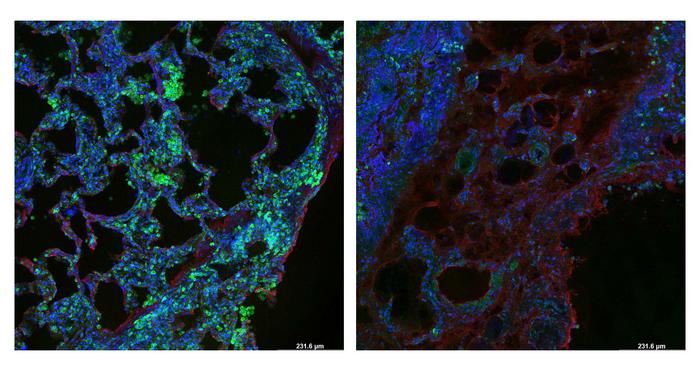Researchers at Weill Cornell Medicine have discovered a protein called SEL1L that plays a critical role in clearing collagen from tissue, and which may be a therapeutic target to help prevent fibrosis, scar tissue that interferes with organ function. The paper, published on Feb. 20 in Nature Communications, provides clues that could lead to drug development for diseases like lung fibrosis which have no therapeutic options currently.

Credit: Michael J. Podolsky
Researchers at Weill Cornell Medicine have discovered a protein called SEL1L that plays a critical role in clearing collagen from tissue, and which may be a therapeutic target to help prevent fibrosis, scar tissue that interferes with organ function. The paper, published on Feb. 20 in Nature Communications, provides clues that could lead to drug development for diseases like lung fibrosis which have no therapeutic options currently.
Corresponding author, Dr. Michael J. Podolsky, assistant professor of medicine at Weill Cornell Medicine, has led a team that searched the human genome for genes involved in the process that triggers specialized cells to engulf and digest excess collagen from tissue. Cells called fibroblasts and macrophages pick up collagen fragments for degradation in lysosomes, the trash compactors of cells.
Normal lungs continuously synthesize collagen and degrade excess collagen, keeping the two processes precisely balanced to maintain healthy tissue architecture. Even when lungs are injured and the body responds by increasing the rate of collagen production, simultaneously collagen degradation is increased to prevent the formation of permanent scar tissue. However, when the two processes are uncoupled, the result is disease. In pulmonary fibrosis, for instance, collagen degradation does not keep pace with collagen production, resulting in an excess accumulation.
The researchers discovered a mechanism that cells use to detect collagen production internally and regulate clearance of excess collagen in tissues. The protein SEL1L acts as a sensor that responds to collagen production by triggering another protein called MRC2 which is involved in the uptake and disposal of collagen.
This study suggests that a defective collagen clearing pathway based on MRC2 is a key part of the imbalance in fibrotic disease. The data show when SEL1L is overproduced in cells, it leads to increased MRC2 production and thereby prevents the accumulation of collagen. This pathway could eventually be therapeutically targeted to drive increased clearance of collagen to improve fibrosis when it is impaired. Next, Dr. Podolsky, who is also an attending physician at NewYork Presbyterian/Weill Cornell Medical Center, plans to investigate how SEL1L is impaired in fibrotic human lungs. The lab is also exploring the molecular consequences of when MRC2 is inadequately triggered in pulmonary fibrosis.
This research was supported in part by the National Institutes of Health grant K08 HL145015 and a Grant-in-aid from The Stony Wold-Herbert Fund.
Journal
Nature Communications




